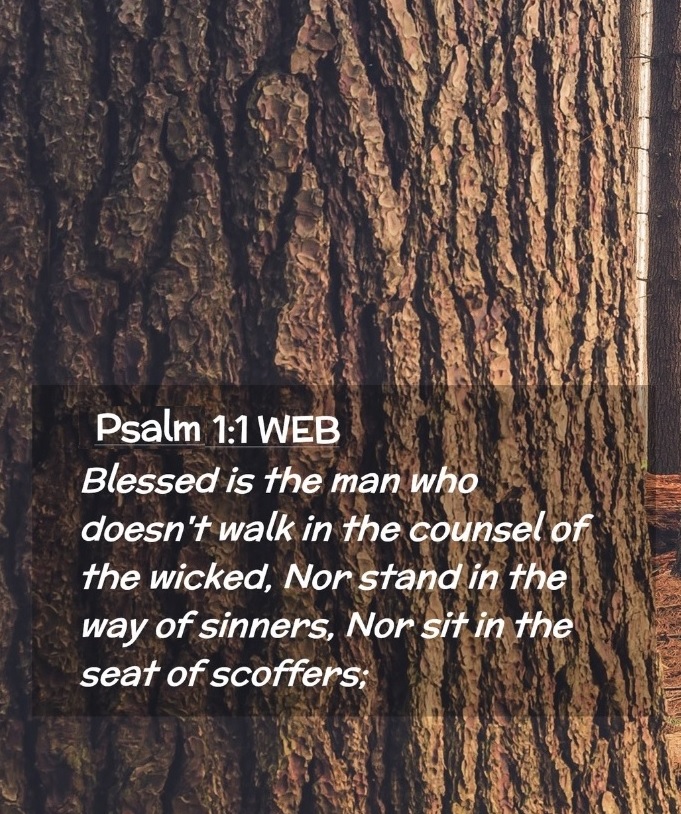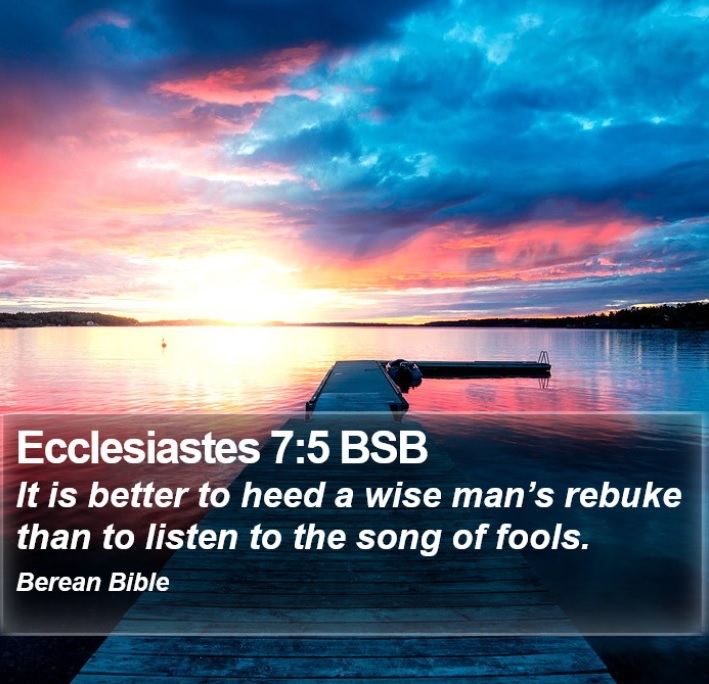“Go therefore and make disciples of all the nations…teaching them to observe all that I commanded you; and lo, I am with you always, even to the end of the age” (Matthew 28:19-20, NASB).
——————–
Contents:
1) “Blessed is the Man” (Psalm 1) (Kyle Pope)
2) Sword Tips #23 (Joe R. Price)
——————–

-1-
“Blessed is the Man” (Psalm 1)
Kyle Pope
What characterizes the one considered “blessed” by God? Riches? Good health? A large family and friends? The first psalm in the Old Testament book of Psalms offers several characteristics that might surprise us:
1. “Blessed is the man who walks not in the counsel of the ungodly” (1a). The man blessed by God does not look to the ungodly for advice. Having rejected the counsel of God’s word, the ungodly should be the last source we consider. If their deeds are sinful, their insights will be equally poisoned by a wicked spirit.
2. “Nor stands in the path of sinners” (1b). The “path” of those is sin as their course of life. The choices they make, the places they frequent, the responses they take to different situations all make up a “path” the blessed man will choose to avoid. He will neither follow it, nor stand in it, because he has chartered a better course.
3. “Nor sits in the seat of the scornful” (1c). Those who reject the guidance of God’s word seldom do so with a dispassionate indifference. To soothe the pains of a guilty conscience, the rebel finds it easier to mock the truth than to simply ignore it. The man blessed by God does not approach serious things with scorn but recognizes the true source of good counsel.
Having begun with three things the man blessed by God does not do, the Holy Spirit now leads the psalmist to one supreme positive characteristic:
1. “But his delight is in the law of the LORD” (2a). What delights you? A lover? A hobby? A favorite food? A law code?—probably not! God’s law is different than the volumes of books that line the shelves in a lawyer’s office. Yes, it offers mandates and prohibitions, but unlike human laws, every word revealed by the Holy Spirit gives to us the counsel of God regarding how best to live our lives.
2. “And in His law he meditates day and night” (2b). The blessed man doesn’t isolate his consideration of God’s word to a few brief hours on Sundays and Wednesdays. He reads it, reads it, and then reads it again. With every meditation he discovers some new jewel of wisdom from the mind of his Creator.
This devotion to God’s word bears great fruit. The Holy Spirit makes this clear in four graphic descriptions of the results of such focused delight:
1. “He shall be like a tree planted by the rivers of water” (3a). The tree growing by the riverside has a constant and unceasing source of water. It is not subject to that uncertainty of rain. It does not rely upon irrigation or the melting snows of some far away mountain. Its source of life stays always near. The blessed man who delights in God’s law finds in it a constant source of life and sustenance.
2. “That brings forth its fruit in its season” (3b). Doing the right thing at the right time isn’t always easy. One left to his own experience alone can miss opportunities, overlook serious dangers, and neglect important responsibilities. The blessed man, following the guidance of God’s word bears fruit at the right time and in the needed proportions.
3. “Whose leaf also shall not wither” (3c). Seasons of life wear upon all living things, but the soul who feeds upon the eternal nourishment of God’s word maintains a youthful spiritual vigor that defies the decay of the flesh. Whether he is a young man or an old man, the blessed man of God who feeds upon the rivers of God’s law maintains an undying vitality that does “not wither.”
4. “And whatever he does shall prosper” (3d). Most human efforts are a mix of failure and success. The athlete doesn’t always score the goal. The investor doesn’t always pick a winner. The farmer doesn’t harvest every seed planted. Unlike all other human endeavors, all efforts the blessed man makes in following the direction of God will “prosper.” No other activity carries such promise.
The Holy Spirit began this psalm by offering three things the man blessed of God does not do. In a similar way, the Holy Spirit ends the psalm by contrasting the hope set before the blessed man with the negative fate that awaits the ungodly:
1. “The ungodly are not so, but are like the chaff which the wind drives away” (4). It is commonly claimed that the Old Testament says nothing about life after death, the resurrection, or final judgment. The contrasting fates of the wicked and the blessed in this psalm refute these claims. While the righteous will not “wither” but “prosper,” the wicked are driven away like chaff in the wind. Is this annihilation of the soul? No. Because the psalm goes on to say:
2. “Therefore the ungodly shall not stand in the judgment” (5a). What judgment is under consideration here? Many wicked avoid temporal judgments in this life, but none can avoid ultimate judgment before God. To “stand in the judgment” here expresses divine approval. Rather than being humiliated and shamed in judgment, those approved of God—those “blessed” shall “stand in the judgment.” The wicked shall not. They will face disgrace and punishment.
3. “Nor sinners in the congregation of the righteous” (5b). This foresees a future “congregation” of God’s people. Who will be included in this assembly of the righteous blessed? Not sinners! Not only will they be unable to “stand” with divine approval at the final judgment, but they will be excluded from the gathering of God’s people into eternity. The psalmist does not teach universal salvation. The fate of the wicked is eternal exclusion from fellowship with God.
The contrast between the blessed man and the fate of the ungodly culminates in two clear statements regarding God’s knowledge of all men:
1. “For the LORD knows the way of the righteous” (6a). The wicked may receive the spotlight while the righteous fade into the background, but God is not blind to the true nature of every soul. The Lord knows the quiet deeds performed by the godly in secret. He sees their trials and knows the good they do. Nothing His people do escapes His notice. He knows “the way of the righteous.”
2. “But the way of the ungodly shall perish” (6b). When this world comes to an end—when human life expires, the deeds of the wicked will be brought to nothing. All popularity, beauty, wealth, and honor “shall perish.” The reality of the final fate of the wicked stands as a concluding encouragement to the righteous. The godly man devoted to God’s word will not find that his way perishes. The blessed condition of the one faithful to God will prosper into eternity.
— Via Focus Online, November 12, 2020
——————–

-2-
“And take…the sword of the Spirit, which is the word of God” (Eph. 6:17).
Sword Tips #23
Joe R. Price
“Poverty and shame will come to him who disdains correction, but he who regards a rebuke will be honored” (Proverbs 13:18).
Nobody is always right. Yet, to hear some people talk, wisdom will die with them! Such arrogance refuses correction when it is needed. Remember, pride goes before destruction, but wisdom “regards a rebuke.”
Be willing to accept God’s correction that turns you away from spiritual danger. His correction is contained in the holy Scriptures.
Avoid the shame and eternal loss that is produced by pride.
Honor will come to you as you yield up your heart and your life to God.
——————–
The Steps That Lead to Eternal Salvation
1) Hear the gospel — for that is how faith comes (Rom. 10:17; John 20:30-31).
2) Believe in the deity of Jesus Christ, the Son of God (John 8:24; John 3:18).
3) Repent of sins. For every accountable person has sinned (Romans 3:23; Romans 3:10), which causes one to be spiritually dead (Ephesians 2:1) and separated from God (Isaiah 59:1-2; Romans 6:23). Therefore, repentance of sin is necessary (Luke 13:5; Acts 17:30). For whether the sin seems great or small, there will still be the same penalty for either (Matt. 12:36-37; 2 Cor. 5:10) — and even for a lie (Rev. 21:8).
4) Confess faith in Christ (Rom. 10:9-10; Acts 8:36-38).
5) Be baptized in water for the remission of sins (Mark 16:16; Acts 2:38; 22:16; 1 Pet. 3:21). This is the final step that puts one into Christ (Gal. 3:26-27). For from that baptism, one is then raised as a new creature (2 Cor. 5:17), having all sins forgiven and beginning a new life as a Christian (Rom. 6:3-4). For the one being baptized does so “through faith in the working of God” (Col. 2:12). In other words, believing that God will keep His word and forgive after one submits to these necessary steps. And now as a Christian, we then need to…
6) Continue in the faith by living for the Lord; for, if not, salvation can be lost (Matt. 24:13; Heb. 10:36-39; Rev. 2:10; 2 Pet. 2:20-22).
——————–
Tebeau Street
CHURCH OF CHRIST
1402 Tebeau Street, Waycross, GA 31501
Sunday: 9 a.m. Bible Classes and 10 a.m. Worship Service. Congregational Song Service: 5 p.m. for every first Sunday of the month.
Wednesday: 7 p.m. Bible Classes
evangelist/editor: Tom Edwards (912) 281-9917
Tom@ThomasTEdwards.com
https://thomastedwards.com/go/all.htm (This is a link to the older version of the Gospel Observer website, but with bulletins going back to March 4, 1990.)